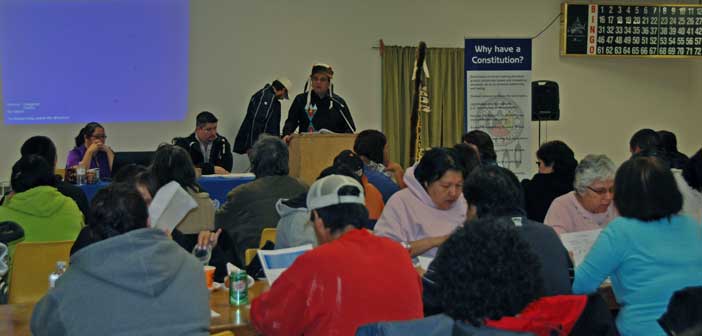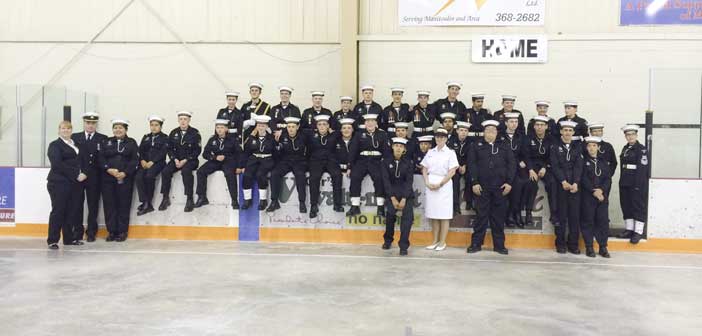Historic G’Chi-Naaknigewin document
WIKWEMIKONG—This Saturday, residents of the Wikwemikong Unceded Indian Reserve will be making history as they mark their ballots to either vote in favour, or reject, G’Chi Naaknigewin, the community’s first constitution.
In a handout from the Wikwemikong Governance Unit, it is explained that G’Chi Naaknigewin is a document that seeks “to ensure the protection of our rights, both as individuals and as a collective.”
“G’Chi Naaknigewin is our constitution,” states a document penned by Wikwemikong legal counsel Tracey O’Donnell on behalf of the community’s Governance Unit. “Although we have traditional forms of governance such as our eagle staff, our pipes, our drums, our songs, our lodges, our ceremonies, those cannot speak on our behalf in the courts. Thus we develop a constitution—Wiikwemkoong G’Chi Naaknigewin—that can speak on our processes. It enables us to make our own decisions here and not have to respond in ways which Indian Affairs decides when then make laws.”
“One example would be the Matrimonial Real Property law which comes into effect December 2014,” it continues. “This law was rejected by many First Nations and all of Ontario First Nations yet it will become law within Wiikwemkoong in December if we do not have our own law or ways to address Matrimonial Real Property. Through G’Chi Naaknigewin, we can set up ways to develop laws that reflect Wiikwemkoong Anshinabek, and not the federal government. Through G’Chi Naaknigewin, we can assert our inherent rights and our jurisdiction.”
“This G’Chi Naaknigewin will mean we can negotiate on our own terms,” the document states. “The relationship we have with the federal government will still exist. The federal government continues to have a fiduciary responsibility to us, but we can demonstrate we have started good governance practices in Wiikwemkoong. Good governance practices are accountability, transparency, responsiveness, equitable/inclusive, effective/efficient, rule of law, participatory and consensus orientation.”
“With the passing of Wiikwemkoong G’Chi Naaknigewin, it will be a document Wiikwemkoong owns,” it continues. “It ensures our elected leadership operates as per G’Chi Naaknigewin, and the G’Chi Naaknigewin confirms rules for Wiikwemkoong government (leadership) and Wiikwemkoong Anishinaabek.”
Governance Administrative Coordinator Lynda Trudeau explained some of the most common inquiries:
Q. Will this mean we become a municipality? A. No, it is a way to protect ourselves and our future to ensure we maintain being Anishinaabe.
Q. If we become a nation, will that mean we no longer receive funding from the Government of Canada and will have to start taxation? A. We will continue to have a relationship with the federal government as they have a fiduciary responsibility to us. It may put us at an advantage, as we develop good governance practices and may attract other economic resources to invest in Wikwemikong.
Q. Will our funding get cut off? A. Our present agreements with the federal government are negotiated, and will continue as such.
Q. What does this mean? A. It means we decide things here for us, and not the government deciding for us.
“We are exercising our right for self-governance, self determination,” Ms. Trudeau told The Expositor. “It doesn’t mean things will change overnight, but if we vote in favour of it, the community says we are going the Anishinaabe way.”
“If it’s voted down, the community has chosen the federal route and we will determine why, what’s missing and why it was not a ‘community document’,” she continued. “Does this mean the community wants to go to a municipal model?”
Throughout the last month, eight Ojibwe-speaking volunteers have been making their way to the homes of those wishing to learn more about the G’Chi Naaknigewin on a one-on-one level.
“It’s been great,” Ms. Trudeau said. “Sitting down and talking to people one-on-one is so different,” she added, noting that one volunteer alone had amassed 146 visits by last week.
[pullquote]“It’s been great,” Ms. Trudeau said. “Sitting down and talking to people one-on-one is so different,” she added, noting that one volunteer alone had amassed 146 visits by last week.[/pullquote]
“This will be a living document,” she said of the constitution, “that’s always in review—it will evolve as the community evolves.”
“It means everything to the community for the very reason that it’s an exercise in our inherent right to determine our way of life as an Anishinaabe people,” Chief Duke Peltier said in a pre-vote interview with The Expositor. “It aims to solidify our jurisdiction and control over our way of life, the control of our territory and, most importantly, to protect the right of our future generations.”
The chief noted that the last discussions his people had with a Crown representative over jurisdiction of territory took place in 1836 “and the solemn promises made by the Crown representatives where they formally pledged that the property of Manitoulin and all the surrounding islands would remain the territory of the Anishinaabe people, free of encroachment of other peoples. We know now that those promises were never kept.”
“Things are changing every day at the federal level,” Chief Peltier said. “The longer we put off making decisions to become a self-determining people, then it becomes tougher to have a meaningful discussion of inherent rights.”
If G’Chi Naaknigewin is approved, the community would then discuss which laws, for the community, they would like to see enacted.
Band members can vote this Saturday, June 14 from 9 am until 8 pm in the council chambers of the band office. A shuttle service is available for residents if they call Ms. Trudeau ahead of time at the band office, 705-859-3122.




